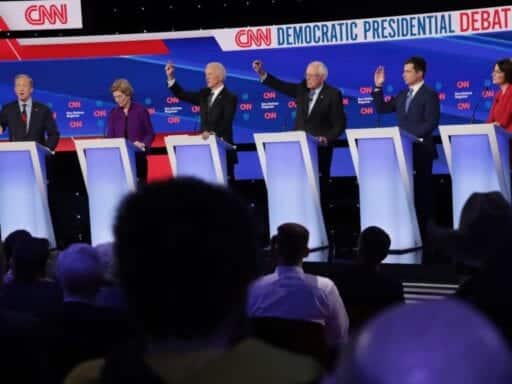Democrats have different plans on troop levels in the Middle East and Trump-brokered trade deals.
Foreign policy dominated the opening section of Tuesday night’s presidential debate, and it allowed the six candidates onstage in Iowa to put some serious daylight between them on issues of war and trade.
Among other things, they debated how many troops to keep in the Middle East and whether they support the US-Mexico-Canada trade deal (USMCA) President Donald Trump negotiated.
At every turn, the candidates found ways to distinguish themselves, something they had largely failed to do with so many hopefuls onstage in previous debates. This time, the smaller debate let voters see just how this batch of 2020 Democrats might serve as commander in chief.
Here’s what they had to say.
US troops in the Middle East: Stay or leave?
A constant refrain from leading 2020 Democrats is the need to end America’s “endless wars,” which would require a drawdown of US troops levels in the Middle East and Afghanistan. But when asked specifically how they would do that, candidates offered differing takes.
Sen. Elizabeth Warren (D-MA) said she wants “all combat troops” out of the region, including Afghanistan. “We’ve turned the corner so many times [in Afghanistan] we’re going in circles in these regions. This has got to stop,” she said. “It’s time to get our combat troops home.”
Warren has yet to publicly clarify what she means by “combat troops.” Does she mean she only wants to bring home service members that have engaged in fighting, or those deployed to the region for the sole purpose of the war like special operations forces? Some have speculated that she wants literally every American soldier, airman, Marine, and sailor to head stateside, though that seems unlikely. Her campaign declined to comment on the record when I asked for clarification.
Former Vice President Joe Biden had a very different answer from Warren’s: “I would leave troops in the Middle East in terms of patrolling the [Persian] Gulf,” he said, “and I think it’s a mistake to pull out the small number of troops that are there now [in Iraq and Syria] to deal with ISIS.”
“ISIS is going to reconstitute itself” if that happens, he added.
Sen. Amy Klobuchar (D-MN) offered a middle path. “I would leave some troops [in the Middle East], but not at the level that Donald Trump is taking us right now,” she said. “Afghanistan, I have long wanted to bring our troops home. I would do that. Some would remain for counterterrorism and training.”
That’s actually similar to what the president wants. In July, Trump told Fox News’s Tucker Carlson that Afghanistan was the “Harvard of terrorists” and that he therefore wanted to leave US intelligence assets and personnel there to continue to combat terrorism.
Still, it seems Klobuchar wants fewer US troops stationed throughout the region, which could potentially lead to her removing Americans Trump recently added in Kuwait, for example.
What’s become clear, then, is that the number of US service members in the Middle East would fluctuate based on which Democrat gets into the Oval Office — should they beat Trump, that is.
USMCA: Good or bad?
Another constant among 2020 Democratic hopefuls to date is that they are generally skeptical of free trade deals. That partly has to do with Trump’s position on the issue, as he rode a populist wave to the presidency by promising to tear up trade agreements that hurt American workers.
But fissures on trade surfaced in Iowa when the discussion turned to the USMCA agreement, the new name of the renegotiated NAFTA deal Trump secured earlier last year. The Senate is expected to vote on it in the coming weeks.
The clearest difference was between Sen. Bernie Sanders (I-VT) and Warren, both the standard-bearers for the party’s progressive left wing. Sanders vowed not to vote for USMCA, while Warren said she would.
“We can do much better than a Trump-led trade deal,” Sanders said. “This deal, and I think the proponents of it acknowledge, will result in the continuation of the loss of hundreds of thousands of good-paying jobs as a result of outsourcing.”
He went on to tout his consistent opposition to free trade deals, including USMCA’s predecessor, NAFTA, and the Trans-Pacific Partnership, a multinational agreement brokered by the Obama administration that failed to pass through Congress.
Sanders also had another complaint about the USMCA: “Every major environmental organization has said no to this new trade agreement because it does not even have the phrase ‘climate change’ in it.”
Warren, who is usually critical of free trade deals, explained why she would approve the USMCA. “This new trade deal is a modest improvement,” she stated. “It will give some relief to our farmers, it will give some relief to our workers. I believe we accept that relief, we try to help the people who need help, and we get up the next day and fight for a better trade deal.”
Former South Bend, Indiana, Mayor Pete Buttigieg, who espouses a more traditional, centrist US foreign policy, also expressed support for the Trump-backed deal. “It has been improved,” he said, but “it is not perfect.”
He went on to slam Washington politicians for not delivering on their promises to American workers that free trade plans would improve their lives.
“My part of the country, in the industrial Midwest, I remember, when they came around in the ’90s, selling trade deals, telling us, ‘Don’t worry about your slice of the pie, the pie will get so much bigger that everyone will be better off.’ And that promise was broken,” he said.
Many experts have long called for Democrats to finally and specifically stake their ground on important foreign policy issues. In Iowa, they started to.
Author: Alex Ward
Read More



